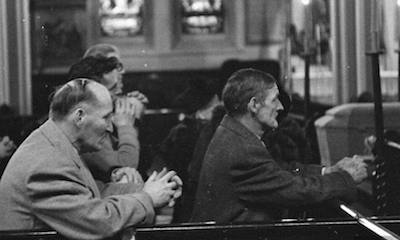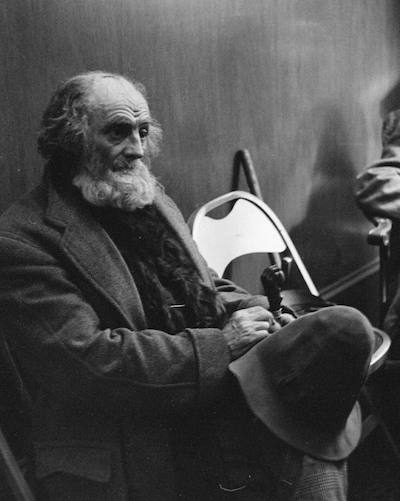This sermon (or a reasonable facsimile) was preached on Sunday, October 20, 2019 at Kingsway Baptist Church. The texts are Lamentations 1:1-6; 3:19-26 and Matthew 5:1-10.
Walter Bruegemann is a world-renowned Old Testament scholar and a faithful voice crying in the wilderness of American Christianity. Last week, in connection with Thanksgiving, I quoted Brueggemann as saying that “expressing hope in a society that lives in despair” is one of the prophetic tasks of the church’s witness. He actually names three such tasks. Here’s the full quote:
“The prophetic tasks of the church are to tell the truth in a society that lives in illusion, grieve in a society that practices denial, and express hope in a society that lives in despair.“
But before we dive into the tasks themselves, we should define what we mean by “prophetic.” It’s a term that may prompt images of crystal balls or enigmatic oracles. The tradition of biblical prophecy is actually not so much about predicting the future as it is confronting the present – exposing the mirages of our age for what they truly are.
The prophets of Israel call God’s people to come to our senses and change our ways – in a word, to repent. To be sure, there are predictions of the future in the books of the prophets but they largely concern the consequences that will result if we don’t snap out it – if we don’t stop deluding ourselves now, in the present. And any portents of pending doom are almost always accompanied by God’s declaration, God’s intention, God’s promise to set things right: to heal, restore, and transform. Which is God’s ultimate goal. God doesn’t seek to rub our noses in our mess so much as to pick us up and set us on a better path.
A prime example of this sort of prophecy at work is the Prophet Nathan’s visit to King David in 2 Samuel chapter 12 to expose the ugly truth of David’s murderous lust for Bathsheba.
Confronting present realities is where we have to begin, and that is what these prophetic tasks named by Brueggemann encourage, exhort, even implore us to do: to engage in practices that enable us to cut through the illusions and delusions of our time (including the ones to which we ourselves cling) to prepare the way for God’s healing, restorative, and transformative work.
And since we started at the end with “expressing hope,” I thought we’d work backwards in the gospel spirit of “the last shall be first and the first shall be last.” Which brings us to grieve in a society that practices denial.
Now, admittedly, grieving doesn’t sound very fun or fulfilling. It’s certainly not as resolute as expressing hope or as dignified as telling the truth. I won’t pretend that it is. Grieving is never pleasant. But it’s necessary. It’s necessary if we’re to find a better path, and be instruments of God’s hope and truth; if we’re to be the people Jesus calls us to be – in Him, with Him, for Him.
That’s why, before we protest too much, we have to remind ourselves that Jesus calls those who grieve “blessed,” which means “happy” as much as “holy.” Blessed are those who mourn, for they shall be comforted (Matthew 5:4).
Still, I’m sure many of us wonder how that could possibly be the case, even if Jesus did say it. Well, here’s my best crack at it: mourning is blessed because grieving is an honest and truthful response to the painful and tragic realities of our world.
mourning is blessed because grieving is an honest and truthful response to the painful and tragic realities of our world.
When we grieve, it means we are and have been engaged. It’s a sign that we have loved and have been loved; that we’re involved in and connected to the world around us; that we are able to see other people, whether we know them or not, as people just like us, made in the image of God just like us, not merely as categories or character types. When we grieve, it means that we recognise brokenness and injustice and tragedy for what they are. It means that we’re aware and alert.
If we’re not grieving, we’re not really seeing. And if we’re not really seeing, then, we are practising denial, too, like much of the rest of our society, whether we’re actively in denial – by pretending things aren’t as complicated or difficult or demanding as they really are – or passively in denial- by not even bothering to look. Either way, denial is denial. And denial is dangerous. It’s destructive to the life Jesus longs for us to have, because denial is an adult form of make believe.
The trouble is denial is so very attractive – attractive because it protects us. It insulates us. It enables us to block out and keep at bay things we’d rather not deal with. However, in shielding us denial also disconnects us – from God, from others, from ourselves, from the world, from the possibility that things could actually be better. It disconnects us from the notion that God desires and intends to make things better – that God desires and intends to use us, the church, to help make things better.
That’s the purpose of the prophets pushing God’s people to snap out of it – to see through the mirages – so God can lead us in a different direction toward truly life-giving oases; so God can reform and transform us into a new people.
That’s why I believe Jesus calls those who mourn blessed: they’re in touch and in tune with life and the world and with God. Their grieving is the foundation upon which change can be built. Grief can be cathartic when we engage it, when we channel it into holy, prophetic lament.
Scripture is full of lament. There’s an entire book of the Old Testament, from which we’ve read this morning, entitled Lamentations. Likewise, the majority of the psalms contained in the Bible are laments – some personal, some communal. All of it is grief. But it’s structured grief – intentionally worded and set in verse – so as to be poured out rather than wallowed in. Grief has to be handled carefully, because it can overwhelm us, drown us even – if we don’t process it and channel it in a healthy way.
That’s precisely what the psalms of lament and the poems contained in the Book of Lamentations do: they give voice to the deep pain, the bewilderment, the betrayal, the loss suffered by God’s people – both individually and collectively – in a way that allows not only the psalmists and the poets to name their grief and cry out to God, but also in a way that asks God to receive it and receive them and move them through it. So, when we speak of lament, of grief, as a prophetic task, we’re not simply talking about the flames of raw emotion – though holy lament is certainly full of that. We’re talking about a kiln that puts those flames to work.
Prophetic, holy lament isn’t anger or blame or resentment that lashes out. Neither is it nostalgia because things aren’t what they used to be. It’s an honest sorrow at what has befallen oneself, one’s community, one’s nation, one’s world. It is deep grief over a loss or an injustice. It’s a reckoning: an acknowledgement that things are not as they should be. But it is never mired or immovable.
Listen again to part of what we read from Lamentations:
How lonely sits the city that once was full of people! How like a widow she has become, she that was great among the nations! She that was a princess among the provinces has become a vassal. She weeps bitterly in the night, with tears on her cheeks; among all her lovers she has no one to comfort her; all her friends have dealt treacherously with her, they have become her enemies. Judah has gone into exile with suffering and hard servitude; she lives now among the nations, and finds no resting place; her pursuers have all overtaken her in the midst of her distress.
There’s two full chapters of this type of grief-stricken expression. Then we arrive in chapter 3:
The thought of my affliction and my homelessness is wormwood and gall! My soul continually thinks of it and is bowed down within me.
But this I call to mind, and therefore I have hope: The steadfast love of the LORD never ceases, his mercies never come to an end; they are new every morning; great is your faithfulness. “The LORD is my portion,” says my soul, “therefore I will hope in him.”
These words are the basis for an old hymn we still sing – a joyous hymn. Can you believe they actually come from Lamentations?
We should note it takes awhile to get there. This is no small or casual leap from Lamentations 1 to Lamentations 3. And the landing doesn’t always hold, certainly not indefinitely. (Lamentations continues on for two more chapters after this, too). But the desire to make that leap is the reason the poet began to write: to pour out and name what needs to be named, to be unburdened, in order to be carried across the chasm – not just for the benefit of the poet himself or herself, but so that others might be carried across as well.
Perhaps the most famous modern day example of this type of lament is a song that Josh and Rob shared with the residents of the Elm Springs Nursing Home at our last Service Sunday: “Tears in Heaven” by Eric Clapton. Clapton wrote the song to process his grief over the loss of his four-year-old son, Conor, who tragically fell to his death from the window of a multi-storey New York City apartment. He didn’t compose it immediately; it took several months, in fact, and he enlisted the help of another song writer, Will Jennings, to finish the verses, to help him get the song where it needed to go. But he got it there and it has endured in the decades since because it not only helped carry Clapton across the chasm of his profound grief but has helped may others, perhaps millions of others, to make that leap, too.
Now I should be clear: prophetic lament can take a variety of forms. Don’t think you have to be a poet or a musician to engage in this work of grieving in a holy, purposeful way. You don’t even have to be a particularly holy person. Prophetic lament might even be able to take the form of comedy.
Comedian Chelsea Handler has a new documentary on Netflix entitled, Hello, Privilege. It’s Me, Chelsea. I’ll confess up front I haven’t seen it yet. I have no idea if it’s any good. But even if it doesn’t amount to much, the concept is her attempt at intentional grieving.
In an interview I heard with Handler, she said the impetus for the documentary was an experience she had as a teenager with a high school boyfriend. For a time, she, who in her own words is “about as white as they come,” lived with him and his family, who are black. The couple got mixed up with drugs, and three times the police caught her and her boyfriend with small amounts of marijuana. Each time, the police told her to go home while they took him into custody. Same offence, in the same spot, at the same time, with the same police officers, yet two very different outcomes. For Chelsea, it was an inconvenience and an embarrassment. For her boyfriend, it was an experience that altered the trajectory of his life. Because of his police record, he lost a college scholarship and that record has continued to follow him, haunt him, and limit his opportunities all these many years later.
At the time, the systemic racial injustice of these incidents didn’t register with her; but it does now, and this documentary is her attempt to channel that grief, to make a leap from it, and to help others do the same.
It’s a project that is certainly a departure for Handler given what I know of her other work. But who knows? It might just have an impact. I hope it will. Comedians can often get us to confront difficult subjects when others can’t. Even if it’s quickly forgotten, though, Chelsea’s got the idea right.
The key is honesty – honesty paired with empathy: a willingness to look carefully, openly, and soberly at the state of ourselves and the state of our world – and be moved by what we see. Because that’s how God is able to move us forward.
No, it isn’t much fun. It’s challenging and unsettling. But prophetic, holy grieving is vitally important spiritual work because it is a catalyst for both truth telling and hope. As long as we dismiss, ignore, or deny the pain in us and around us, we’re stuck.
So, in the moment of silence that follows, I’d like to encourage you to ponder, “What do I grieve?” Or perhaps, “What do I resist grieving?” or, “What do I need to grieve?” Because that willingness to grieve may very well be the springboard to God’s healing transformation we all long to see and experience.
Blessed are those who mourn. Amen.





























